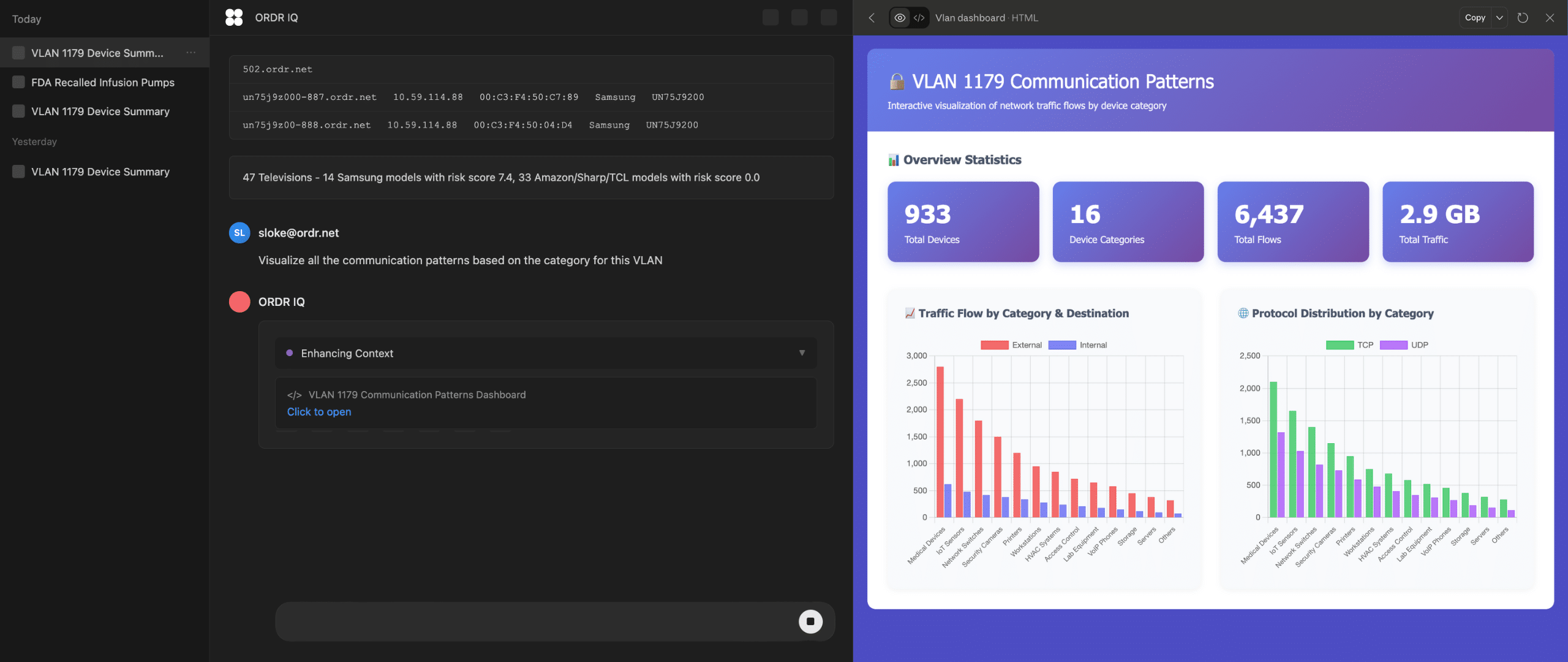MEDIA ALERT
What is Being Announced?
NHS Digital has recently amended the NHS Digital’s Data Security and Protection Toolkit (DSPT) making it mandatory for NHS organizations to now keep an up-to-date inventory of all medical devices including security vulnerabilities and data security. All organizations that have access to NHS patient data and systems must adhere to the requirements in this toolkit to provide assurance that they are practising good data security and that personal information is handled correctly.
ORDR, the leader in agentless security for all connected devices, is today launching a guide to assist healthcare organizations to meet the new DSPT criteria. Healthcare organizations are particularly vulnerable to cyber-attacks such as ransomware, due to outdated operating systems running on medical, Internet of Things (IoT) and Operational Technology (OT) devices. This is due to the fact that many of these devices, in particular medical devices, remain in operation for a number of years and cannot be easily replaced for cost reasons.
ORDR in its recent Rise of the Machines report found 19% of deployments with devices running outdated operating systems Windows 7 and older, and almost 34% of deployments with devices running Windows 8 and Windows 10, which are expected to end-of-life in 2023 and 2025 respectively. Organizations need an automated way to identify these devices-at-risk and segment them to ensure security of these devices, keep them in operation and avoid the costs of replacing devices early.
What Is DSPT?
NHS Digital’s Data Security and Protection Toolkit (DSPT) is an online self-assessment tool that enables organizations to measure their performance against the National Data Guardian’s 10 data security standards. All organizations that have access to NHS patient data and systems must use this toolkit to provide assurance that they are practicing good data security and that personal information is handled correctly. This system is subject to ongoing development.
What Does It Mean for Healthcare Organizations?
DSPT compliance will force many organizations to take a fresh look at their cybersecurity programme and make changes to align with NHS Digital requirements. Core security functions such as inventory, risk management, and threat detection will be essential to maintaining compliance, and organizations should look for efficient, automated systems that can help provide coverage for all connected devices — from traditional servers, workstations, and PCs to IoT, IoMT and OT devices.
Bob Vickers, Head of UKI at ORDR commented:
“Even though data security standards ask healthcare organizations to ensure technology is secure and up to date with no unsupported operating systems, this is actually a global medical challenge for most. Connected medical devices can range widely, and often ran on outdated systems, even though they are a critical part of business operations.
We need to remember that securing medical devices will define the future of healthcare. Security teams need the right tools to increase visibility into risks, bring devices into compliance, optimize utilization and protect them from cyberattacks. spend. Here at ORDR, healthcare organizations can not only gain complete visibility into devices and risks, they can also keep track of NHS Cyber Alerts as a data feed into the ORDR Systems Control Engine (SCE) and address cyber threats such as ransomware on their network. By leveraging automation to drive efficiencies, they can ensure the highest standards of security for patient safety.”
How Can ORDR Help?
ORDR SCE can arm organizations with a powerful platform to gain visibility into their network-connected devices, automatically expose potential risk, and automatically enforce policies for rapid mitigation during cyber attacks or segment high-risk devices to only “allowed” communications, passively and without agents. ORDR is already working with the University Hospital Southampton NHS Foundation Trust (UHS) and the University Hospitals of North Midlands NHS Trust (UHNM Trust) to tackle these challenges, and to improve healthcare cybersecurity and patient safety.
Some of the key criteria that ORDR can help healthcare organizations with are: Personal Confidential Data, Managing Data Access, Responding to Incidents, Continuity Planning,
Unsupported Operating Systems and IT Protection.
The ORDR system has the following key functionality to help meet the above criteria:
- Real-time Asset Inventory: ORDR brings together a unique combination of traffic analysis and AI to automatically discover and classify every device on the network. This includes high-fidelity information such as make, classification, location, and application/port usage.
- Vulnerability Management: ORDR delivers a variety of unique capabilities in the area of vulnerability management. The platform includes a built-in vulnerability scanner to identify devices affected by a variety of industry-specific security alerts or recalls.
- Behaviour and Risk Profiling: ORDR includes a built-in IDS engine to detect threats and devices that are under active attack. ORDR also automatically learns every device’s unique communication patterns, known as its ORDR Flow Genome. This provides a baseline that can be used to find suspicious and anomalous behaviours that could be the sign of an unknown threat.
- Automated Response: ORDR can can automate the creation of NGFW policies, ACL blocks, quarantine VLAN assignment, port shutdown, or session termination with one click of a button– enforced on existing switches, wireless controllers, and firewalls, or via NAC platforms—to mitigate risks. By baselining device behaviour, ORDR can also dynamically create segmentation policies such as firewall rules that provide devices with necessary access while limiting unnecessary exposure.
Prepare today
The Data Security and Protection Toolkit is an annual self-assessment. The deadline for the 2021-22 publication is 30 June 2022. See how ORDR maps to the “Data Security And Protection Toolkit (DSPT)”.

Interested in
Learning More?
Subscribe today to stay informed and get
regular updates from ORDR Cloud


